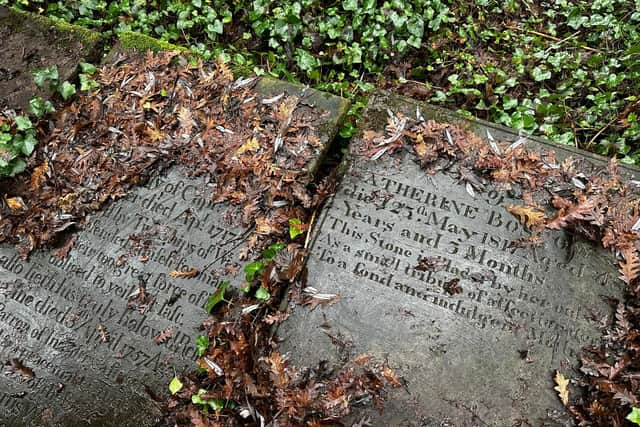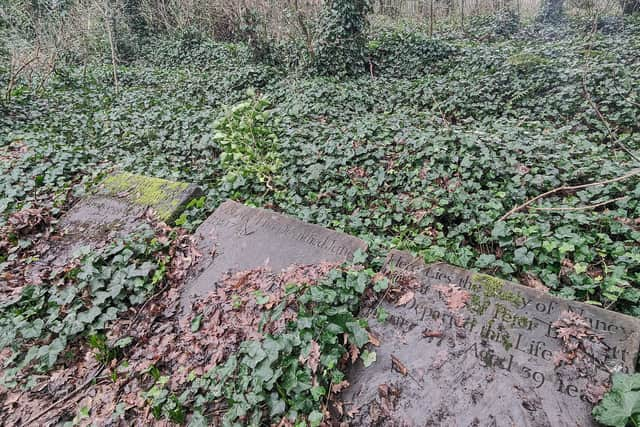More than 1,300 'lost' Liverpool gravestones to be uncovered in major new project
and live on Freeview channel 276
More than 1,300 'lost' gravestones of 'significant and historical importance' are being uncovered in Liverpool.
St Peter’s Church once stood proudly on Church Street, but was demolished in 1922, around two centuries after it opened.
Advertisement
Hide AdAdvertisement
Hide AdAfter the demolition, 1,375 gravestones were removed and placed in Walton's Parochial Cemetery, more commonly known as Rice Lane Farm.
Now, more than 100 years later, a new project, in a partnership with Liverpool Parish Church, Rice Lane Farm and Jonathon Wild, is uncovering the gravestones, which are hidden underground.
Local historian, Jonathon Wild said: "I have always been interested in graveyards and churches in and around Liverpool and have been fortunate to have visited many churches and church towers in and around the area, which has led to my interest in gravestones.
"They tell a story of the person who was buried there and with the help of Ancestry, you can then start to build up a bigger picture of who that person was, especially if you are trying to research your own family tree."
Advertisement
Hide AdAdvertisement
Hide AdDuring a visit to Rice Lane Farm 'many years ago' Jonathon discovered a number of gravestones lying in a line, at the rear of the cemetery.
After taking photographs of the gravestones, Jonathon said he 'thought no more about them' but after revisiting the images months later, he realised the stones pre-dated the cemetery.


Jonathon explained: "After further research on Ancestry, I discovered that these were the gravestones from St Peter’s Church in Church Street, but with only ten being visible, I assumed there were part of an overspill plot."
A write-up of the demolition of the church by Henry Peet revealed that 1,375 gravestones were removed to the Parochial Cemetery (Rice Lane Farm), and Jonathon discovered that the ten stones he had found were part of that list.
Advertisement
Hide AdAdvertisement
Hide AdJonathon said: "Having gone back and looked at the plot of land with new eyes, it transpired that the ten visible gravestones were part of the 1,375 in situ, completely covered up by nature by ivy, trees and bushes.
"They are positioned at a 45-degree angle on soil banks and must have at least 200 gravestones in a row, of at least 6 rows deep."
Now, after creating historical documents and health and safety documents and with permission from Liverpool Parish Church, Jonathon is beginning to remove the ivy and overgrowth from each gravestone, in partnership with Rice Lane Farm.
Jonathon says this 'will result in one of the largest uncovering of gravestones in modern times in Liverpool', adding that each one will be 'uncovered slowly using the correct process and with hand tools only'.


Advertisement
Hide AdAdvertisement
Hide AdHe continued: "They will be photographed in situ, measured, their inscriptions noted. We will then run these names through Ancestry which will provide further information on the person buried and we may then be able to plot in a map of where they lived in the area.
"These images will be stored in a public database so that everyone can see the work that we are doing to uncover these gravestones in the hope that we can reunite people with their family gravestones."
Jonathon added: "I am grateful to both Lucy who is the Manager at Rice Lane City Farm and also Fr Crispin Pailing M.B.E who is the Rector of Liverpool Parish Church (and the landowners) who have allowed me to take charge of this historical uncovering of Liverpool’s ‘lost’ history."
In partnership with Rice Lane Farm, a Facebook group has been set up to provide updates on the project called and can be found at St Peter’s Church Street – The Lost Gravestones.
